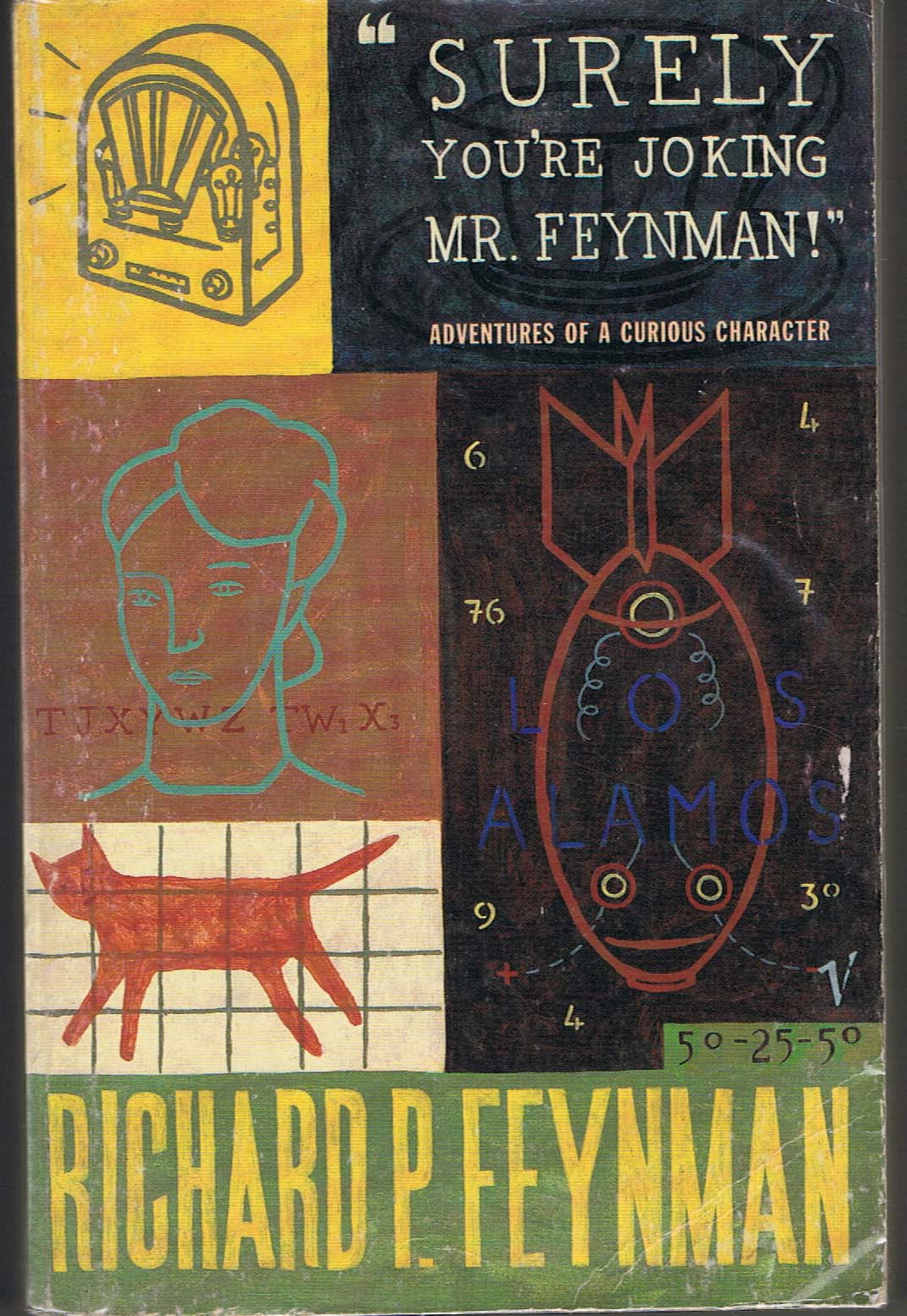I was watching an episode of The Big Bang Theory where Leonard celebrates his birthday, and Wollowitz presents him with a signed copy of Feynman’s Lectures on Physics. By then I’d watched enough BBT episodes to know that Richard Feynman won a Nobel Prize for Physics (and is somewhat of a god to theoretical physicists), but I had a nagging feeling I’d come across that name somewhere else.
Last week, I was rooting through my shelves for a book to swap at the FFP book discussion, when I spotted a book I’d forgotten about, a copy of Surely You’re Joking, Mr. Feynman! (Adventures of a Curious Character), a semi-autobiographical collection of stories narrated by Feynman, caught on tape by his friend Ralph Leighton. I’d gotten it for about P30 at a Scholastic warehouse sale last year, and I got it mainly because the cover looked interesting and I had a bag to fill, but I had no idea what it was about.
 My curiosity was piqued so I took it down from the shelf, and leafed through the first few pages.
My curiosity was piqued so I took it down from the shelf, and leafed through the first few pages.
Now I’ve always been geeky but I’ve never been a science geek. I’ve never liked my science subjects, thankfully I only had three of them in college, and if I had to choose I’d rather do Math than Science. While I’d always gotten good grades in school, my science grades squeaked by, good enough to qualify for honors but I never particularly excelled in them (except for Environmental Science, because I was angling for a cellphone from my mom that semester).
Anyway, I started reading the book because I wanted to see how long it would take for my brain to short circuit (when I attempted to read Stephen Hawking’s A Brief History of Time, I didn’t even last five minutes) and I was pleasantly surprised to find that it wasn’t about Physics at all; it was like sifting through Feynman’s pensieve!
A few pages into the book, I was floored — I love funny books, and it was one of the funniest books I have ever read! In fact, I think Feynman would have fit right in with the cast of BBT and given Sheldon a run for his money.
The first story was about Feynman’s childhood, and I was laughing uproariously at his home experiments: an uproarious burglar alarm that went off when his parents came to check on him at night (it went BONG! BONG! BONG!); a spark coil that caught on fire and filled his room with smoke; and how he got a reputation for fixing radios by thinking!
The stories range from downright silly (stealing a door from his fraternity house, observing ants on his windowsill, joining a Brazilian samba band) to serious (his work on the Manhattan Project, the death of his wife, the state of science education in Brazil, textbook evaluation in America), but everything is told in Feynman’s entertaining manner that you just keep on reading and reading and reading. Feynman is a fascinating dude — a superhuman intelligence, a compulsion for problem solving, an unsatiable hunger for knowledge, the guilelessness and mischief of a six-year old, the spirit of a mad scientist, the bravado of a prizefighter, and a knack for storytelling.
“You only live one life, and you make all your mistakes, and learn what not to do, and that’s the end of you.”
– Richard Feynman
One of my favorite stories in the book is Feynman’s fascination with safecracking when he was working on the Manhattan Project (e.g. the A-bomb) in Los Alamos, which housed the project’s think tank. Because of the secrecy of the project, there was a lot of paranoia over confidential files, which were stored in locked filing cabinets, which Feynman was mischievously trying to outsmart.
Feynman learned how to pick open the padlocks, jiggling a paperclip to push the pins inside it, so the shop improved the security by adding a long rod that ran down the handles, then fastened by a padlock. Feynman poked through the back, slid a moveable piece of the drawer and picked the papers out of people’s filing cabinets when they weren’t looking. Thus the filing cabinets were again replaced, this time with combination locks.
Of course, Feynman loved a puzzle and wanted to get past the locks again! He started with some intelligent guesswork (trying 400 number combinations in half an hour), and then he notices that when a drawer is open, the first two numbers are aligned on the lock. So he spied on his colleagues’ open drawers (even the ones at another Manhattan Project site, Oak Ridge) and kept a list, so he would only have to guess the third number. He gets a reputation for safecracking, and is called on for help every time anyone is locked out of a filing cabinet. When he manages to open a lieutenant’s safe, the lieutenant sends out a memo for everyone to change their combinations, and no one wanted him near their workstations anymore because they might have to change their combinations again.
There is a hilarious episode where Feynman needed a document from the Los Alamos Library and in seconds he cracks the combination to one of the lockers in the Declassification section (which has all the papers with all the secrets of the Manhattan project), managed by his friend Frederick de Hoffman (groan, a mathematical constant — the base of natural logarithms). And when he figured out that the combination is used on all of de Hoffman’s nine filing cabinets, he played a little trick, leaving little anonymous notes in each of the cabinets. De Hoffman found the notes and turned pale and trembly at the discovery that someone has cracked his safes, and Feynman let him stew for a bit before letting his friend know what he had done!
There’s also a great story about how he learned to draw — and actually became quite good at it his work gained a following. He signed his work as “Ofey” (a play on ‘Au Fait’) and sold a fair amount of artwork. Clearly, there was no stopping this guy when he put his mind to something.
Surely You’re Joking, Mr. Feynman! is an edifying look into an amazing character and a brilliant mind. If I’d read this book when I was moaning and groaning over high school physics, perhaps I would have been more inspired.
***
Disclaimer: While I don’t condone the atomic bombings of Hiroshima and Nagazaki which resulted from the Manhattan Project (I can’t; I spent most of my schoolgirl years taking part of an annual commemoration of the twin bombings), I do recognize that the think tank behind it, Feynman included, was a gathering of the greatest minds the world will probably ever know. Which just goes to show — knowledge is a very powerful thing!
***
Surely You’re Joking, Mr. Feynman!, trade paperback, 5/5 stars
Book #92 for 2010
*Feynman photo credit: American Institute of Physics, Ofey painting: Museum Syndicate
[amazonify]::omakase::300:250[/amazonify]




“it was like sifting through Feynman’s pensieve”
I’m more than halfway through rereading the Harry Potter series and have felt immersed in Harry Potter-ness. I can’t tell you how much I appreciated that description :)
This book sounds so out of the ordinary, and so much like The Big Bang Theory. Great review :)
Harry Potter’s been such a big part of my life! :) I should do a re-read soon.
Coincidentally, it’s Harry Potter’s birthday today! Harry Birthday!
Nice review. Hope I’m the first one in line to borrow it. :P
Yepyep, you are, and I bet you’ll get a kick out of it!
I love BBT, I will try to get my hands on a copy of this if I chance finding it on bargain books.
Thanks for the review!
BBT is awesome. I think the writers are guided by Feynman’s humor; I felt like I was watching BBT as I was reading this book.
Really loved the review.. Am gonna read this book asap. :)
Thanks Sana Rose. Happy reading!
A big thank you for your post. Want more.
This is my all-time favorite book. I’ve read it several times, and often quote sections of it. I enjoyed your review.
If you haven’t already read its sequel, What Do You Care What Other People Think?, I recommend it. Published posthumously, it includes anecdotes, letters, poetry, and one rather long section about the space shuttle Challenger investigation that the first volume had no room for.
There was a 1996 movie based on stories from the two books, Infinity, starring Matthew Broderick as Feynman and Patricia Arquette as his first wife, Arline. It was rather forgettable, but an interesting curiosity. The books are much better.